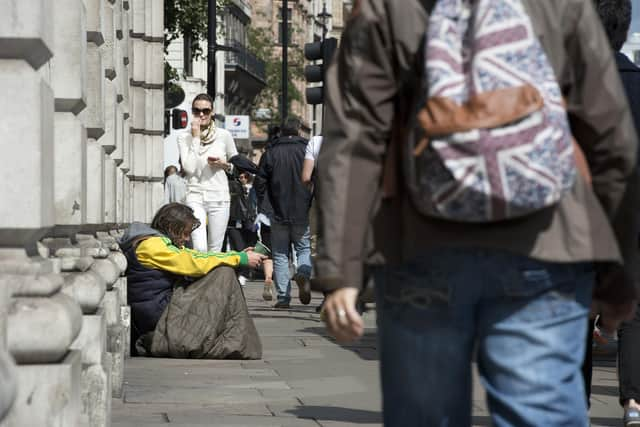More than 150 prosecutions in Nottinghamshire for begging and rough sleeping in past five years
and live on Freeview channel 276
It comes as the Government faces criticism over parts of the Criminal Justice Bill, which will replace the Georgian-era Vagrancy Act. The new bill could allow police to fine "nuisance" rough sleepers.
Homeless charity Crisis said people living on the streets need compassion and support rather than being cast into the criminal justice system.
Advertisement
Hide AdAdvertisement
Hide AdFigures from the Ministry of Justice show there were 181 prosecutions in Nottinghamshire under the Vagrancy Act in the five years to June 2023.


Of these, 180 were for "begging" offences and one for "sleeping out" offences.
Under the 1824 law, anyone prosecuted faces a fine of up to £1,000 and a criminal record.
Across England and Wales, there have been nearly 2,888 prosecutions under the act – just 13 were for sleeping out, while the rest were for begging.
Advertisement
Hide AdAdvertisement
Hide AdOverall, 2,300 (80 per cent) resulted in a conviction, including 139 in Nottinghamshire.
Matt Downie, Crisis chief executive, said the figures paint a "grim picture" of the reality of life on the streets.
He added: "Not only are people forced to live in fear, suffering regular violence and abuse, but they must also contend with the threat of being arrested. No-one should be criminalised for being homeless.
"The Vagrancy Act was, and continues to be, a cruel and counterproductive piece of legislation. And yet, as it stands, its incoming replacement – the Criminal Justice Bill – will be even more punitive, increasing the level of fines and introducing a vague definition of 'nuisance' rough sleeping."
Advertisement
Hide AdAdvertisement
Hide Ad"What people need is compassion, support, and the ability to build a life away from the streets. Casting people into the criminal justice system is not the answer," he said.
He added more social homes, proper funding for bespoke support services and ditching the proposals in the Criminal Justice Bill is needed to tackle rough sleeping.
Separately, freedom of information requests by the Liberal Democrats showed there were 2,412 arrests across 29 police forces since 2019 under the Vagrancy Act.
It included 80 arrests by Nottinghamshire Police.
Layla Moran, Liberal Democrat MP, said: "Experts across the sector have long advocated for a compassionate approach to homelessness. But instead, this government is intent on treating rough sleepers with cruelty and criminalisation."
Advertisement
Hide AdAdvertisement
Hide AdHousing charity Shelter said parliament must not enact the new legislation.
Chief executive Polly Neate said: "It is the Government's catastrophic failure to build enough social homes combined with spiralling private rents that has led to record numbers of people not being able to afford to live anywhere."
She added: "Everyone at risk of sleeping rough should have a right to suitable emergency accommodation, and to end homelessness for good it must invest in genuinely affordable social homes – we need 90,000 a year."
A Government spokesperson said: "We are determined to end rough sleeping for good and we have a plan to tackle the root causes of why people end up on the streets, backed by an unprecedented £2.4 billion.
Advertisement
Hide AdAdvertisement
Hide AdThey added the Vagrancy Act will be replaced with new legislation "focused on supporting people to get off the streets" while allowing local authorities and the police to "address behaviour that can make the public feel unsafe".